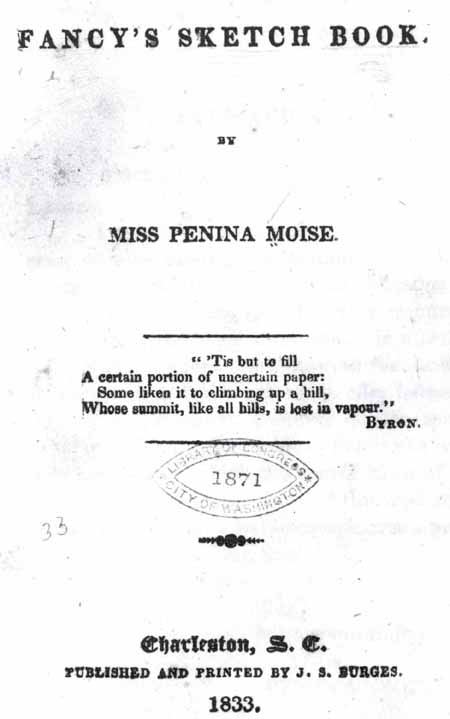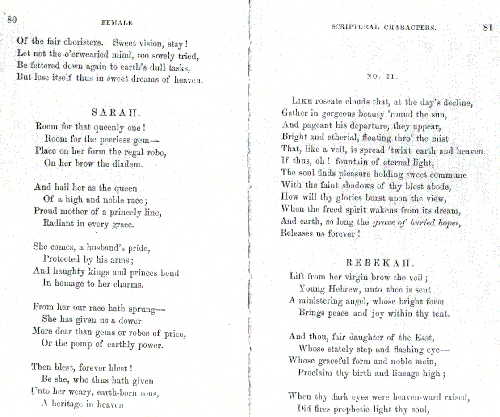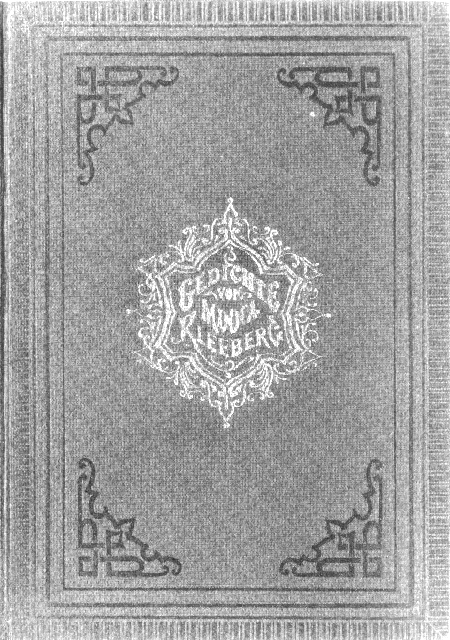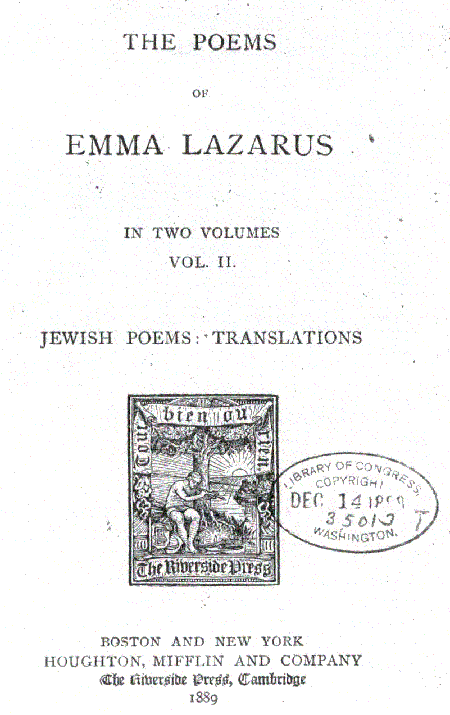Nineteenth-Century Female American Poets
From women publishers, women patrons, and women printers we
turn to women authors, and limit ourselves to one place, one time, and one
genre of literature. In nineteenth-century America we may seek in vain for one
Jewish male we might call a poet, but we do meet four women who gained
distinction as poets: Penina Moise (1797-1880) [See also the biography of Moise], Rebekah Hyneman (1812-1875), Minna Kleeberg (1841-1878), and Emma Lazarus (1849-1887) [See also the biography of
Lazarus].
Penina Moise
Born in 1797 in Charleston, S.C., then the largest
Jewish community in America, Penina Moise lived there the rest of her life.
After her father died when she was twelve, she had no further formal
education; nevertheless, she persisted in study and reading and soon turned to
writing. Self-taught, she became a widely published writer, her poems and
sketches appearing in the Washington Union, New York's The Home
Journal, Boston's Daily Times, the New Orleans Commercial Times,
Isaac Leeser's The Occident, Godey's Lady's Book, and her
hometown newspapers. Members of her large family intermarried and strayed from
the faith, but for Penina her religion was the center of her life. For some
time she was superintendent of Beth Elohim's Sunday School in Charleston, and
after the Civil War, she joined her sister and niece in running a private
school. By that time she had gone blind, but she continued her literary
activity by dictating poems and essays to her niece.
Fancy's Sketch Book is the name the Charleston poet, Penina Moise, chose for her little book of poems. Five are of Jewish interest, "The Hero of Gilead," "Cain," "Joseph's Dream" on biblical themes, and two on the contemporary American Jewish scene, "On the Death of My Preceptor Isaac Harby, Esq.," and "To Persecuted Foreigners." Charleston newspaper editor Isaac Harby was the founder of the Reformed Society of American Israelites. The persecuted foreigners are her own people in the old world, whom she urges to come to the new, promising:
Oh, not as strangers shall your welcome be, Come to the homes and bosoms of the free.
Penina Moise, Fancy's Sketch Book, Charleston, South Carolina, 1833. Rare Book and Special Collections Division.
 |
Two books remain to bear witness to her gifts. A collection
of her early poetry, Fancy's Sketch Book, was published in Charleston
in 1833. Few copies have survived. Looking through the Library's copy, we find
verses of general interest and a few of Jewish content, such as "The Hero
of Gilead" and "on the Death of My Preceptor Isaac Harby Esq."
A poem inviting those who seek freedom to come to these shores, "To
Persecuted Foreigners," has a verse which speaks to her Jewish brethren:
If thou art one of that oppressed race,
Whose pilgrimage from Palestine we trace,
Brave the Atlantic--Hope's broad anchor weigh,
A Western Sun will gild your future days.
Her poems were soon forgotten, but her hymns continued to
be sung. Of the 2 10 hymns in Hymns Written for the Use of Hebrew
Congregations, Charleston, which, in the two years 1856 and 1857, went through
four editions, 180 are by Penina Moise. A hymn "For the Sick" closes
with:
Lengthen out the little span
Of Thy worshipper, O Lord!
Nor, till I reform my plan,
Cleave fore'er the vital cord.
As the dial's shadow turned
At the pray'r of Judah's king;
Let not my appeal be spurned,
Save me still Thy praise to sing.
In the eighty-third year of her life the vital cord was
cloven fore'er. A stanza in one of Miss Moise's hymns might serve as her
epitaph:
Lord! To Thee will I adhere
Though condemned in grief to languish
Though the whole of my career
May be spent in tears and anguish.
See I not a better land?
Hold I not a Father's hand?
Rebekah Hyneman
Born in Philadelphia to a Jewish father and Christian mother, Rebekah Gumpert,
raised in her father's faith, remained a devout Jew all her life. Following a
business failure, her father had to take the family to Bucks County, where there
were no facilities for formal education. Like Penina Moise, Rebekah acquired her
literary background by individual study, mastering French and German, and later
in life, Hebrew. She married Benjamin Hyneman, took his name and reaffirmed his
faith as her faith; but when she was five years wed, mother of a son and
expecting another child, her married life came to an end. Benjamin never
returned from a business trip to the West. It was believed that he was murdered
for the valuable jewelry he carried to sell. Rebekah never remarried and took to
writing stories, a novelette entitled Woman's Strength, but most of all poems,
many published in The Occident. In 18 5 3 a collection of them, The Leper and
Other Poems, was published in Philadelphia.
The love for her faith, its people, its holy days and holy
places shines through her words. She writes of her biblical namesake:
When thy dark eyes were heaven-ward raised,
Did fires prophetic light thy soul,
And point to thee the weary path,
Thy children tread to win their goal?
Deep in each earnest Jewish heart
Are shrined those memories of the past,
Memories that time can ne'er efface,
Nor sorrow's blighting wing o'ercast.
Of "Israel's Trust," she writes:
Borne down beneath insulting foes,
Defamed, dishonored, and oppressed,
Our country fallen and desolate,
Our name a by-word and a jest
Still are we Thine--as wholly Thine
As when Judea's trumpets' tone
Breathed proud defiance to her foes,
And nations knelt before her throne.
We are Thine own; we cling to thee
As clings the tendril to the vine;
Oh! 'mid the world's bewildering maze,
Still keep us Thine, forever Thine!
The first book of poems on Jewish themes was Rebekah Hyneman's The Leper and Other Poems, issued by the Jewish publisher and communal leader of Philadelphia, Abraham Hart. in her preface, the author proclaims "the very sincere love I bear for the faith of my adoption" (she having been born of a Jewish father but a Christian mother). That love is found on almost every page, especially in her series of twelve poems on "Female Scriptural Characters." The first two are on Sarah and Rebecca, of which our illustration offers a sampling.
Rebekah Hyneman, The Leper and Other Poems, Philadelphia, 1853. General Collection.
 |
Again and again, her life was scarred by tragedy. Early
widowed, she also lost her two sons. Barton suffered long from a fatal disease;
Elias Leon, who at twenty-eight volunteered for service in the Civil War, was
captured and imprisoned in the dread Andersonville prison. in half a year, cruel
treatment and starvation took its toll. These lines she wrote are a fitting
epitaph:
Now let me die!
The bloom of earth has passed away--
Its pleasures pall, its flowers decay--
The hopes that lured with dazzling ray,
Low, withered lie.
Oh! placid sleep,
I sink at last in thy embrace;
My task is done--a weary race
Was mine on earth; let my resting-place
Be lone and deep.
Minna Kleeberg
When Minna Kleeberg arrived in the United States from
her native Germany in 1866, she brought with her a reputation as a
well-regarded poet. A year earlier she had gained wide recognition for her
poem, "Ein Lied vom Salz," a powerful plea for the removal of the
Prussian tax on salt. Her poetry expressed devotion to her faith and a passion
for social justice.
Daughter of a physician, she received as fine an education
as a girl could obtain in mid-nineteenth-century Germany. After her marriage
to Rabbi L. Kleeberg, her poetry turned to liturgical creations, while
continuing to serve as a vehicle for social expression. Her poetry appeared in
a variety of German-language periodicals in Germany and in the United States.
Most of her poems were lyrical, some topical-urging the emancipation of women,
calling for the broadening of democracy-and some liturgical. A gathering of
her poems, Gedichte, was published in 1877 in Louisville, where her
husband was serving as rabbi.
Minna Kleeberg was best known to the American Jewish
community for her hymns which appeared in the most widely used Jewish hymnal
in nineteenth-century America, Isaac M. Wise's Hymns, Psalms and Prayers,
In English and German (Cincinnati, 1868). Ten German hymns by Minna
Kleeberg form the largest number by any poet. They celebrate the Torah, man,
faith, and the holidays.
A poet on two continents was Minna Kleeberg, who gained some renown in her native Germany, and again in America where she relocated with her husband, Rabbi Louis Kleeberg. Her book of poems, Gedichte, was published in Louisville, 1877, where her husband was serving as rabbi. She was better known in her adopted country for her liturgical poems. Ten hymns in German, the largest number by any poet, appear in Isaac M. Wise's Hymns, Psalms and Prayers, Cincinnati, 1868.
Minna Kleeberg, Gedichte, Louisville, 1877. General Collection.
 |
Less than two years after settling in New Haven, to which
her husband had been called, she breathed her last on the last day of 1878. In
his eulogy for his dear departed wife, Rabbi Kleeberg recalled:
Almost from her childhood she complained of the
subordinate position which tradition and custom assigned to woman. Upon her
thirteenth birthday and the following Sabbath she shed bitter tears that she
was not, like Jewish boys of her own age, entitled to take part in the
public reading of the law, and by this rite be solemnly consecrated to the
cause of Israel ... The vindictive accusations of Richard Wagner ... she met
in a widely circulated paper, with a few bristling articles. Her poetical
effusions, as well as her bold and vigorous defence of her co -religionists,
were acknowledged by many letters of appreciation from all quarters, even
from the other side of the ocean. The Crown Prince of Prussia, the
Chancellor Bismarck, Edward Lasker ... The departed was a poet by the grace
of God.
Emma Lazarus
Almost the entire second volume of The Poems of Emma Lazarus is devoted to Jewish poems. Among these are evocations of deeply felt Jewish sentiments, passionate cries for the renewal of the Jewish national spirit and translations from medieval Jewish poets Solomon Ibn Gabirol, Judah ha-Levi, and Moses Ibn Ezra. Certainly the most gifted and best known American Jewish literary figure of the nineteenth century, her essays on Jewish themes are no less important than her poetry.
(Emma Lazarus) The Poems of Emma Lazarus, 2 volumes, New York (1889).
Rare Book and Special Collections Division.
 |
The leading Jewish literary figure by far in
nineteenth-century America was the poet Emma
Lazarus. Her sonnet, "The New Colossus," engraved on the base of
the Statue of Liberty, has assured her a measure of immortality. More will be
said of her later. For now, let the stanza of one of her poems suffice, a poem
for the New Year 5643 (1882-83), which saw the onset of Jewish immigration
from Eastern Europe to Palestine and to America:
In two divided streams the exiles part,
One rolling homeward to its ancient source,
One rushing sunward with fresh will, new
heart.
By each the truth is spread, the law
unfurled,
Each separate soul contains the nation's
force,
And both embrace the world.
Sources: Abraham J. Karp, From
the Ends of the Earth: Judaic Treasures of the Library of Congress,
(DC: Library of Congress,
1991).
|